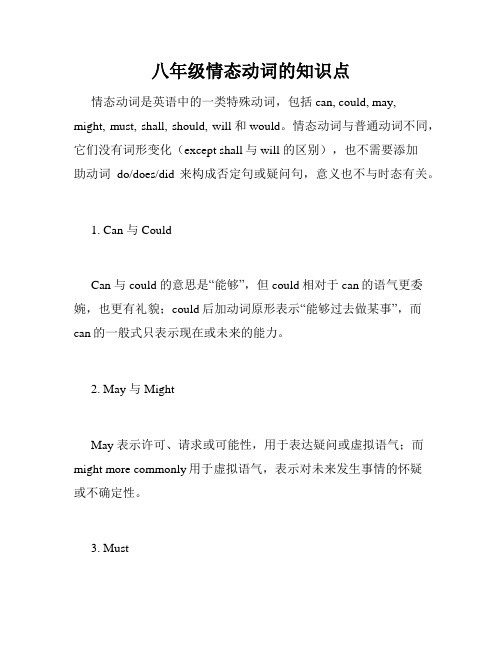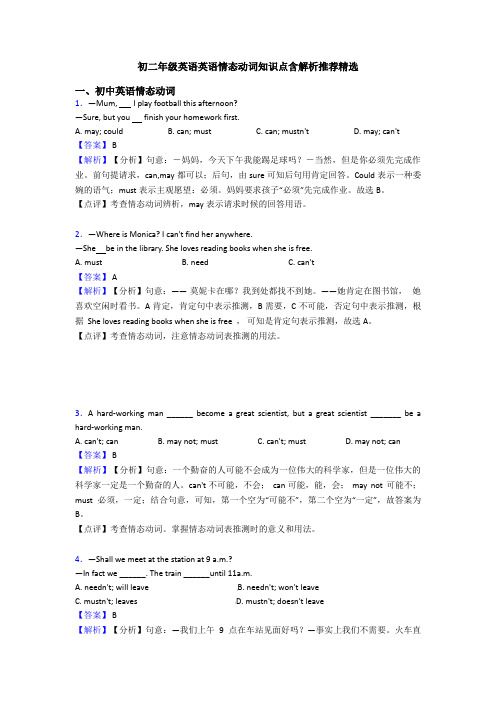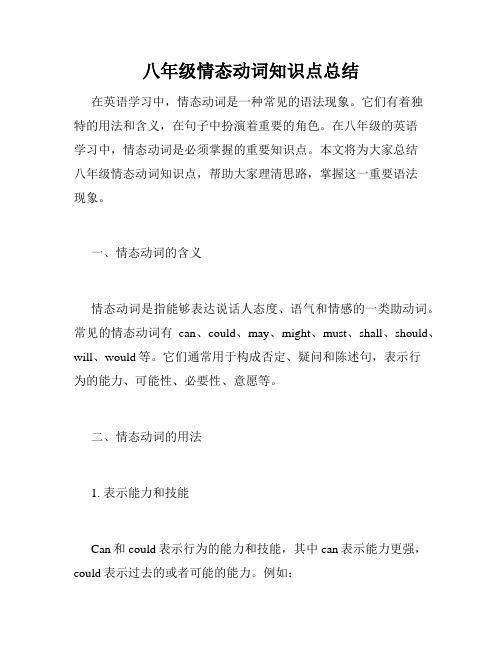初二年级英语英语情态动词知识点及解析推荐精选
八年级情态动词的知识点

八年级情态动词的知识点情态动词是英语中的一类特殊动词,包括can, could, may, might, must, shall, should, will和would。
情态动词与普通动词不同,它们没有词形变化(except shall与will 的区别),也不需要添加助动词do/does/did来构成否定句或疑问句,意义也不与时态有关。
1. Can 与 CouldCan 与could 的意思是“能够”,但could相对于can的语气更委婉,也更有礼貌;could后加动词原形表示“能够过去做某事”,而can的一般式只表示现在或未来的能力。
2. May 与 MightMay 表示许可、请求或可能性,用于表达疑问或虚拟语气;而might more commonly用于虚拟语气,表示对未来发生事情的怀疑或不确定性。
3. MustMust强调必须、不可避免,表示绝对肯定或高度推断;用于表达命令或建议,以及对情况的强烈表示。
4. Shall 与 ShouldShall 和should用于表达命令、请求或建议,但shall主要用于将来时,而should则是一种情态动词,强调道义义务和道义要求,较具有礼貌和客观性。
5. Will 与 WouldWill 表示将要发生的事情,也表示愿望或决心;Would则常用于虚拟语气和条件句,表示假设、愿望或敬语。
6. Can与May的用法差异Can 表示某人能够做某事,能力在第一位。
而may则强调许可、允许的意义,是语气委婉的表达方式。
7. Should与Would的用法差异Should是一种道义上的情态动词,引申出一定的礼貌和可能性;而would则更多地表示愿望和推测,即假设的语气。
8. Must 和Have to两者不同点:must是限定词,have to 则比较口语化,常用于口语中;must表示主观推断,而have to则表示客观事实。
9. 动词原型与情态动词连用情态动词和动词原形连用是比较常见的用法。
初二年级英语英语情态动词知识点含解析推荐精选

初二年级英语英语情态动词知识点含解析推荐精选一、初中英语情态动词1.—Mum, I play football this afternoon?—Sure, but you finish your homework first.A. may; couldB. can; mustC. can; mustn'tD. may; can't【答案】 B【解析】【分析】句意:-妈妈,今天下午我能踢足球吗?-当然,但是你必须先完成作业。
前句提请求,can,may都可以;后句,由sure可知后句用肯定回答。
Could表示一种委婉的语气;must表示主观愿望:必须。
妈妈要求孩子“必须”先完成作业。
故选B。
【点评】考查情态动词辨析,may表示请求时候的回答用语。
2.—Where is Monica? I can't find her anywhere.—She be in the library. She loves reading books when she is free.A. mustB. needC. can't【答案】 A【解析】【分析】句意:——莫妮卡在哪?我到处都找不到她。
——她肯定在图书馆,她喜欢空闲时看书。
A肯定,肯定句中表示推测,B需要,C不可能,否定句中表示推测,根据 She loves reading books when she is free ,可知是肯定句表示推测,故选A。
【点评】考查情态动词,注意情态动词表推测的用法。
3.A hard-working man ______ become a great scientist, but a great scientist _______ be a hard-working man.A. can't; canB. may not; mustC. can't; mustD. may not; can【答案】 B【解析】【分析】句意:一个勤奋的人可能不会成为一位伟大的科学家,但是一位伟大的科学家一定是一个勤奋的人。
外研版英语初二年级英语英语情态动词知识点含解析百度文库

外研版英语初二年级英语英语情态动词知识点含解析百度文库一、初中英语情态动词1.— Dick, ________ I use your e-dictionary? — Yes, sure. ________ you give it to David after you use it?A. will; WouldB. may; MightC. can; CouldD. shall; Should【答案】 C【解析】【分析】句意:一Dick我可用一下你的电子词典吗?一当然可以。
在你用完后你能把它给他David吗?根据句意及题干分析第一空表示请求允许,所以可以用may或can;第二空是表示对别人的请求.所以用could表示更加委婉,故选C。
2.—Where is Monica? I can't find her anywhere.—She be in the library. She loves reading books when she is free.A. mustB. needC. can't【答案】 A【解析】【分析】句意:——莫妮卡在哪?我到处都找不到她。
——她肯定在图书馆,她喜欢空闲时看书。
A肯定,肯定句中表示推测,B需要,C不可能,否定句中表示推测,根据 She loves reading books when she is free ,可知是肯定句表示推测,故选A。
【点评】考查情态动词,注意情态动词表推测的用法。
3.You _____ walk too close to the edge of the path because you might fall and hurt yourself.A. mayB. mightC. needn'tD. musn't【答案】 D【解析】【分析】句意:你不能走得太靠近路的边缘,因为你可能跌倒伤害自己。
A. may 可以,表允许;B. might可能,表推测;C. needn't不必,指没有必要;D. musn't不能,表示不允许或禁止。
八年级英语中情态动词的用法归纳总结

1.情态动词可以用来表示能力和才能:- Can:表示能力和可能性。
例如:I can swim.(我会游泳)- Could:表示过去的能力和可能性。
例如:When I was young, I could run very fast.(我小的时候跑得很快)2.情态动词可以用来表示请求和许可:- Can:表示请求、许可和推测。
例如:Can I borrow your pen?(我可以借你的笔吗?)3.情态动词可以用来表示建议和意愿:- Should:表示应该、建议和责任。
例如:You should study harder.(你应该更加努力学习)- Would:表示愿意、请求和建议。
例如:Would you like some tea?(你想要一些茶吗?)4.情态动词可以用来表示可能性和推测:- Might:表示可能性和推测。
例如:It might rain tomorrow.(明天可能会下雨)- May:表示可能性和推测。
5.情态动词可以用来表示义务和必须:- Must:表示义务和必须。
例如:We must finish our homework.(我们必须完成作业)- Should:表示应该和期望。
例如:You should apologize to her.(你应该向她道歉)总结起来,八年级英语中的情态动词有can, could, may, should, would, might和must,它们可以表示能力、请求、许可、建议、意愿、可能性、推测、义务和必须。
不同的情态动词在不同的语境下有不同的用法和含义,所以需要根据具体语境和意图进行准确使用。
初中情态动词知识点归纳

初中情态动词知识点归纳情态动词一.专题知识梳理知识点1:情态动词特征1)情态动词(modal verb)本身有词义,表示说话人的语气或情态。
2)情态动词没有人称,数的变化,后跟动词原型。
知识点2:常见情态动词用法1)can(1).表示能力、许可、可能性。
表示能力时一般译为“能、会”,即有种能力,尤其是生来具备的能力,此时may和must均不可代替它。
如:She can swim fast, but I can’t . 她能游得很快,但我不能。
I can see with my eyes.我用眼睛看。
(2).表示许可,常在口语中。
如:You can use my dictionary. 你可以用我的字典。
2)could(1).can的过去式,意为“能、会”,表示过去的能力。
如:He could write poems when he was 10. 他十岁时就会写诗。
(2). could在疑问句中,表示委婉的语气,此时could没有过去式的意思。
如:Could you do me a favor?你能帮我个忙吗?—Could I use your pen? 我能用一下你的钢笔吗?—Yes, you can.可以。
(注意回答)3)must(1).must表示主观看法,意为“必须、一定”。
Must I hand in my homework right now? 我必须现在交作业吗?(2)其否定形式mustn’t表示“一定不要” “千万别” “禁止,不许”如:You mustn’t play with fire. 你不许玩火。
You mustn’t be late.你一定不要迟到。
(3)对must引导的疑问句,肯定回答为must,否定回答为needn’t 或don’t have to .如:—Must I finish my homework?我现在必须完成作业吗?—No, you needn’t.不,你不必。
八年级情态动词知识点总结

八年级情态动词知识点总结在英语学习中,情态动词是一种常见的语法现象。
它们有着独特的用法和含义,在句子中扮演着重要的角色。
在八年级的英语学习中,情态动词是必须掌握的重要知识点。
本文将为大家总结八年级情态动词知识点,帮助大家理清思路,掌握这一重要语法现象。
一、情态动词的含义情态动词是指能够表达说话人态度、语气和情感的一类助动词。
常见的情态动词有can、could、may、might、must、shall、should、will、would等。
它们通常用于构成否定、疑问和陈述句,表示行为的能力、可能性、必要性、意愿等。
二、情态动词的用法1. 表示能力和技能Can和could表示行为的能力和技能,其中can表示能力更强,could表示过去的或者可能的能力。
例如:He can swim very fast.(他游泳很快。
)She could play the piano when she was young.(她小时候会弹钢琴。
)2. 表示推测和可能性May、might和could用于表示可能性和推测,其中may表示可能性更大,could表示可能性更小。
例如:It may rain tomorrow.(明天可能下雨。
)He might be at home.(他可能在家里。
)3. 表示必要性和义务Must表示强制性的必要性,should表示建议性的必要性,其中must用于肯定句和疑问句,should用于陈述句中。
例如:You must wear a seatbelt while driving.(开车时你必须系上安全带。
)You should eat more vegetables.(你应该多吃蔬菜。
)4. 表示意愿和请求Will、would和can用于表示意愿和请求,其中will和would用于陈述句和状语从句中,can用于疑问句和请求。
例如:He will help me with my homework.(他会帮我完成作业。
初二英语情态动词的具体用法全面解析
初二英语情态动词的具体用法全面解析【考纲解读】根据对情态动词部分在全国各地中考试题的分析可知,今后该部分将是重点考查点之一。
其考查重点为:1、情态动词在一般疑问句中的问与答2、情态动词表示猜测的用法3、will与shall的用法4、dare与need的用法【知识点梳理】情态动词的具体用法:(一)情态动词概说1.情态动词也是“辅助性”动词,用来表示说话人的语气或情态。
情态动词所表示的情态有:请求、命令、允诺、可能、需要、敢于、愿望、义务、能力等。
2.情态动词本身有词义,但词义不完全,不能单独用作谓语,没有人称和数的变化,且后面只跟动词原形。
如:她会唱英文歌曲。
She cans sing an English song.(F)She can sings an English song.(F)She can sing an English song.(T)3.有些情态动词的过去时与其原形相同,有些与原形不同。
(1) 与原形相同的有:must --- must ought to --- ought to(2) 与原形不同的有:can --- could will --- wouldmay --- might shall --- shouldneed --- needed dare --- dared have to --- had to(二)情态动词的种类:(见下表)(三)情态动词的否定形式:cannot --- can’t could not --- couldn’t may not--- mayn’tmight not--- mightn’t must not --- mustn’t will not --- won’twould not --- wouldn’t need not --- needn’t shall not --- shan’tshould not --- shouldn’t ought not --- oughtn’t dare not --- daren’t(四)常用情态动词的用法:1.can与could1). can(1)表示体力或脑力方面的“能力”,也能表示根据客观条件能做某事的“能力”。
八年级知识点:情态动词+Unit 2 How often do you exercise
情态动词+Unit 2 How often do you exercise?(Section A)一、情态动词1.定义情态动词是一种本身有一定的词义,表示说话人的情绪、态度或语气的动词,但不能单独作谓语,只能和其他动词原形构成复合谓语,没有人称和数的变化2.常用的情态动词:can,could ,may,might,must,need,ought to,dare,shall,should,will,would等3.can/could① 表示能力(如体力脑力方面),意为“能”、“会”例:Can you speak Chinese?② 表示请求或者允许,多用在口语中,意为“可以”、“能”等客观条件的允许,用于疑问句中用来提出要求,用于否定句中表示不允许例:Can you help me?③ 表示理论上的可能例:He can be out now.④ 表示说话人的猜测、怀疑、不肯定等,常用于否定句、疑问句、感叹句,带有感情色彩例:Can he be back?⑤ could 可作为can 的过去式,也可以在提出请求时表示委婉例:Could you help me?4.must① 表示“必须”“一定要”,多强调说话人的主观看法,对于must开头的一般疑问句,如果要做否定回答,可以用“neednt”“dont have to”不能用“mustnt”(mustnt则表示“一定不要”“禁止”)② 表示推测,意为“准是”“一定是”但是通常只用于疑问句中,在否定句或疑问句中通常用“cant”5.must和have to的区别① must表示“必须”的意思,表示主观愿望、看法,没有人称、时态和数的变化② have to 表示“必须”,“不得不”,表达的是客观的需要,后接动词原形,有人称、时态和数的变化,疑问形式或否定形式要借助动词“do”来完成6.练习① His room is dark. He must to bed.A.goB. be goingC. have been gone② -Will your father stay home tonight?-I`m not sure. He to work.A.must goB. can goC. may be going③ -Where is Tom?-He isn't here. I think he have gone home.A. mayB. mustC. might二、八年级上册二单元Section A1、重点词汇on weekends 在周末go to the movies 去看电影help with housework 帮着做家务hardly ever 几乎从不go shopping 去购物every day 每天once a week 每周一次twice a week 每周两次three a week 每周三次use the Internet 上网stay up late 熬夜at least 至少more than 多于less than 少于such as 例如2、重点词组want sb.to do sth. 想让某人做某事be good for 对...有好处not...at all 一点儿也不the answer to... ...的答案go to the dentist 去看牙医3、重点句型-How often do you watch TV?-How many hours do you sleep every night?-What's your favorite program?-Hi,Claire,are you free next week?-Hmm,next week is quite full for me,Jack.-How come?-I go to the movie maybe once a month.-How often do they stay up late?-He plays at least twice a week.-We found that ...-...but we were surprised that...-Although many students like to watch sports, game shows are the most popular.-It is good to relax by using the Internet...-It is healthy for the mind and the body.三、词汇: 词性变化:1.health n. → adj. ______________ 保持健康_______________ ______________2.result n. → v. 导致,产生,结果_______________3.mind n. → v. 介意____________________4.die v. → n. ______________; adj. _______________重点短语:1.怎么会呢_________________2.改进我的英语__________________3.对我的健康有好处____________________4.几乎不____________________5.根本不____________________6.熬夜做某事_____________________7.多久一次_______________________8.超过,多于_____________________9.少于___________________________10.一周两次_______________________四、重要句子1.– 你多久看一次电影?– 我大约一个月看三次电影。
八年级情态动词知识点归纳
八年级情态动词知识点归纳情态动词是英语语法中的重要部分,它们在句子中起着很关键的作用。
在英语八年级学习过程中,学生们需要掌握情态动词的用法和特点,以便正确地运用它们。
本文将从三个方面总结八年级情态动词知识点,分别是情态动词的定义和分类、情态动词的用法、情态动词的否定和疑问句。
一、情态动词的定义和分类情态动词是指表示说话人态度或者看法的动词,它们的基本意义是表示一种能力、可能性、必要性、允许性、义务性、愿望等。
常见的情态动词有can、could、may、might、shall、should、will、would、must等。
根据情态动词的用法和意义,可以将其分为五类:1. 表示能力或可能性的情态动词:can、could、may、might。
例如:I can speak English fluently. 我能流利地说英语。
2. 表示建议或命令的情态动词:shall、should。
例如:You should go to bed early. 你应该早点睡觉。
3. 表示必要性或义务的情态动词:must、have to。
例如:You must finish your homework. 你必须完成你的作业。
4. 表示意愿或决心的情态动词:will、would。
例如:I will help you with your English. 我会帮你做英语。
5. 表示推测和猜测的情态动词:may、might、could。
例如:He may be late for the meeting. 他也许会迟到会议。
二、情态动词的用法情态动词的用法有以下几点:1. 情态动词后面要接动词原形。
例如:I can swim. 我会游泳。
2. 情态动词没有人称和数的变化。
例如:You can ride a bike. 你会骑自行车。
3. 情态动词不能单独作为谓语动词,必须与其他动词一起使用。
例如:She should study harder. 她应该更努力地学习。
人教版初二英语知识点汇总
人教版初二英语知识点汇总Unit 1 仪式与礼仪 (Ceremonies and Etiquette)语法1.情态动词 (Modal Verbs)–can/could: 表示能力–may/might: 表示允许、可能–must: 表示必须、肯定–should/ought to: 表示应该、建议–will/would: 表示意愿、习惯、预测2.疑问词 (Question Words)–what, who, whom, whose, which, when, where, why, how–它们用来引导疑问句和作为一些复合词语的成分。
词汇1.仪式 (Ceremonies)–wedding: 婚礼–graduation: 毕业典礼–birthday: 生日–funeral: 葬礼2.礼仪 (Etiquette)–manners: 礼貌、行为规范–polite: 礼貌的–impolite: 不礼貌的–greeting: 问候、招呼3.词根词缀–-ful: 充满…的–-less: 无…的阅读与写作1.借助上下文推测词语含义2.围绕着仪式和礼仪,谈论交际中的礼貌、得失、情感等话题3.书写礼节性文章,如:感谢信、祝贺信等Unit 2 海底世界 (Underwater World)语法1.一般过去时 (Simple Past Tense)–表示过去发生的动作或情况2.过去进行时 (Past Continuous Tense)–表示过去某个时刻正在发生的动作或情况–表示过去某个时刻正在进行的一段时间的动作或情况3.比较级与最高级 (Comparative and Superlative)–比较级:比较两者之间的大小、程度等–最高级:在同一范围内比较三者或三者以上之间的大小、程度等词汇1.海洋生物 (Marine Life)–fish: 鱼类–shark: 鲨鱼–whale: 鲸鱼–dolphin: 海豚–octopus: 章鱼2.海底景观 (Underwater Scenery)–coral: 珊瑚–reef: 礁–seaweed: 海藻–sand: 沙子–rock: 岩石3.词根词缀–-ful: 充满…的–-less: 无…的阅读与写作1.理解科普类文本,如海洋生物、海底景观等2.以海底生物或海底景观为题材写作3.讨论环保问题,提高保护海洋的意识Unit 3 歷史人物 (Historical Figures)语法1.现在完成时 (Present Perfect Tense)–表示过去发生的动作或情况对现在产生的影响或状态2.倍数表达 (Expressions of Multiples)–three times, ten times, half, twice, etc.词汇1.歷史人物 (Historical Figures)–Lu Xun: 鲁迅–Marie Curie: 玛丽·居里–Leonardo da Vinci: 列奥纳多·达·芬奇–William Shakespeare: 威廉·莎士比亚–Susan B. Anthony: 苏珊·B·安东尼2.近义词 (Synonyms)–bad: poor, awful, terrible, etc.–good: great, excellent, wonderful, etc.阅读与写作1.阅读并理解与历史人物有关的文章2.进一步理解英语写作中的语法知识,并进行应用3.了解不同历史人物的生平、成就、思想等方面,并进行分析和讨论Unit 4 电影与明星 (Movies and Stars)语法1.一般现在时 (Simple Present Tense)–表示现在的习惯、状态、和真理等2.介词 (Prepositions)–表示方位、时间、原因等词汇1.电影 (Movies)–action movie: 动作片–comedy: 喜剧–drama: 剧情片–romance: 爱情片2.明星 (Stars)–Tom Hanks: 汤姆·汉克斯–Angelina Jolie: 安吉丽娜·朱莉–Jackie Chan: 成龙–Zhang Ziyi: 章子怡3.词根词缀–-ful: 充满…的–-less: 无…的阅读与写作1.阅读关于电影和明星的电影介绍及其他相关文章2.提高英语写作及口语表达能力,表达个人对电影和明星的态度与看法3.了解不同国家的电影和明星,扩大视野,请认识其他文化Unit 5 旅游与文化 (Travel and Culture)语法1.疑问句与回答 (Questions and Answers)–一般疑问句:句末加上问号即可,不需要改变动词形式–特殊疑问句:疑问词+一般疑问句2.时间 (Time)–日期:year, month, day–时间:hour, minute, second词汇1.旅游 (Travel)–destination: 目的地–attraction: 景点–tour: 旅游–ticket: 票–guide: 导游2.文化 (Culture)–festival: 节日–cuisine: 美食–customs: 国情习俗–art: 艺术3.词根词缀–-ful: 充满…的–-less: 无…的阅读与写作1.理解旅游信息、文化类文章,并复述文章中的重点内容2.对旅游信息、文化类话题进行表达,包括自我介绍和讲解等3.完成书面作业,包括旅游计划、议论文等,以提高英语写作能力Unit 6 健康与生活 (Health and Life)语法1.祈使句 (Imperative Sentences)–用来表示请求、命令、建议、警告等2.祈使句的否定形式 (Negative Imperatives)–在谓语动词前面加don’t 或 do not词汇1.健康 (Health)–diet: 饮食–exercise: 运动–sleep: 睡眠–stress: 压力2.生活 (Life)–hobby: 爱好–music: 音乐–movie: 电影–game: 游戏3.词根词缀–-ful: 充满…的–-less: 无…的阅读与写作1.理解有关健康和生活的文本,并提高表达和理解能力2.通过日常生活中的例子掌握祈使句的用法和技巧3.书写健康、生活类文章,以提高英语写作水平。
- 1、下载文档前请自行甄别文档内容的完整性,平台不提供额外的编辑、内容补充、找答案等附加服务。
- 2、"仅部分预览"的文档,不可在线预览部分如存在完整性等问题,可反馈申请退款(可完整预览的文档不适用该条件!)。
- 3、如文档侵犯您的权益,请联系客服反馈,我们会尽快为您处理(人工客服工作时间:9:00-18:30)。
初二年级英语英语情态动词知识点及解析推荐精选一、初中英语情态动词1.— I take the magazine out of the reading room?— I'm sorry you .A. Could; couldn'tB. Must; couldn'tC. Will; can'tD. May; can't【答案】 D【解析】【分析】句意:——我可以把杂志带出阅览室吗?——对不起,你不能。
could 能,可以;must必须;will将;may可以;can能,可以,can't不可以,不能。
此处表示请求许可,用could或者may,由could或者may构成的一般疑问句,肯定回答用yes,主语+can,否定回答用sorry,主语+can't,结合选项,故答案选D。
【点评】考查情态动词的辨析。
注意理解句意,理解选项,根据语境,选出正确的答案。
2.—I've bought all the food for the party tonight.—Thank you. Then I _______ go to the supermarket.A. can'tB. mustn'tC. shouldn'tD. needn't【答案】 D【解析】【分析】句意:-今天晚上我买好了所有晚会的食物。
-谢谢你。
那么我就不必去超市了。
A. can't不能;B. mustn't不准,不允许,禁止;C. shouldn't不应该;D. needn't 不必。
你买好了,我就不必去买了。
故选D。
【点评】考查情态动词,表示不必要应使用need的形式,要牢记不同的情态动词的意思。
3.Please don't make so much noise. I ________ hear the speaker very well.A. needn'tB. can'tC. shouldn'tD. mustn't【答案】 B【解析】【分析】句意:请不要发出那么多噪音。
我不能很好地听清楚发言者的话。
needn't不必;can't不能;shouldn't不应该;mustn't禁止。
根据前半句的Please don't make so much noise.可知别人发出了太多噪音,所以他无法听见演讲者的话,故用情态动词can't。
故选B。
【点评】考查情态动词,结合句意和词义做出判断。
4.—Shall we meet at the station at 9 a.m.?—In fact we ______. The train ______until 11a.m.A. needn't; will leaveB. needn't; won't leaveC. mustn't; leavesD. mustn't; doesn't leave【答案】 B【解析】【分析】句意:—我们上午9点在车站见面好吗?—事实上我们不需要。
火车直到11点才离开。
needn't情态动词,不需要,没必要;mustn't情态动词,不允许,语气强烈,本题含义只是“不需要”,并没有“禁止、不许”这样强烈的语义。
not...until...,意为“直到...才...”,表示将来发生的事情,所以使用一般将来时态的否定形式won't。
故选:B。
【点评】考查情态动词辨析,固定搭配not...until...。
一般将来时态。
5.Teenagers allowed to drive .A. should not beB. should be notC. not should be【答案】A【解析】【分析】句意:年轻人不应该被允许驾车。
Should是情态动词,其否定表达一般在在后面加副词not,故选A。
【点评】此题考查含有情态动词的被动语态的否定形式。
平时注意记忆情态动词的记忆和用法。
6.—Where is Mom now?—I'm not sure. She _________ be in the kitchen.A. shallB. mayC. needD. must【答案】 B【解析】【分析】句意:—妈妈现在在哪里?—我不确定,她也许在厨房。
A. shall 将要; B. may 可以,可能; C. need 需要; D. must必须,一定;根据I'm not sure可知是不确定;故选B。
【点评】此题考查情态动词表推测的用法。
7.I can't go with you. I _______ stay at home until my parents come back.A. canB. mayC. mustD. could【答案】 C【解析】【分析】句意:我不能和你一起去。
我必须呆在家直到我父母回来。
A. can能,表示能力;B. may可以,表示许可;C. must必须,强调主观愿望;D. could可以,表示允许、请求。
父母没回来前,我必须待在家。
故选C。
【点评】此题考查情态动词的用法。
8.We don't allow taking magazines out, but you ____________ copy the article you need on the machine over there.A. canB. mustC. shouldD. would【答案】 A【解析】【分析】句意:我们不允许把杂志带出去,但是你可以在那里抄下你需要的文章。
can能,能够,可以;must必须;should应该;would将;此处表示可以,允许,故选A。
【点评】此题考查情态动词辨析。
弄清每个情态动词的使用规则,根据上下文的联系确定所使用的情态动词。
9.The girl riding a horse there be Shirley. Her left leg was badly hurt in an accident yesterday.A. needn'tB. may notC. can'tD. mustn't【答案】C【解析】【分析】句意:那边骑马的女孩不可能是雪莉。
她的左腿在昨天的事故中受了重伤。
A.needn't不必;B. may not不可以;C. can't不可能,表示否定的推测;D. mustn't 不准,不允许,表示禁止。
本题表示否定的推测,不可能:can't。
故选C。
10.Harry's been driving all day—— he be tired.A. needB. canC. shallD. must【答案】 D【解析】【分析】句意:哈利已经开了一整天车了——他一定累了。
根据句意可知,开了一整天车,所以推测他累是一定的。
所以用情态动词must。
故选D。
11.Rock music ______ sound popular with the young, but it's not the favor of the aged people.A. mustB. needC. shouldD. may【答案】 D【解析】【分析】句意:摇滚音乐在年轻人中听起来受欢迎,但是它不受上了年龄的人的赞同。
must, 表示猜测时,指把握比较大的肯定猜测,肯定……;need需要;should,应该;may,表示把握比较小的肯定猜测,可能,也许。
结合句意,故选D。
【点评】考查情态动词辨析,注意几个常见情态动词的意思和用法。
12.According to the law, traffic keep to the left in England.A. mayB. mustC. needD. can【答案】 B【解析】【分析】句意:根据法律规定,在英国车辆必须靠左形式。
A.may可以,表示允许;B.must必须,表示要求;C.need需要,表示必要性;D.can能,表示能力。
根据According to the law,可知法律的要求,应是必须的,应用must,故答案为B。
【点评】考查情态动词。
掌握情态动词的常用法。
13.——Do you have any plans for this summer vacation? ——I'm not sure. I ___ take a trip to Taiwan.A. mustB. needC. mayD. should【答案】C【解析】【分析】句意:一今天暑假你有什么计划吗?一我还不确定。
我可能去台湾去旅行。
A.必须,一定;B.需要,必要;C.可能;D.应该。
根据句中I'm not sure可知,说话人还没有确定的计划,所以这只是一个可能,应选C。
14.— Sorry, I forgot to take money with me. Maybe I can't buy the book you like.— Mum, you ______ worry about it. We can pay by Alipay (支付宝).A. can'tB. needn'tC. mustn'tD. shouldn't【答案】 B【解析】【分析】句意:——对不起,我忘记带钱了。
也许我不能买你喜欢的书。
——妈妈,你不用担心。
我们可以用支付宝支付。
A. can't不能,指不允许或否定推测;B. needn't 不需,指没必要;C. mustn't不能,表禁止;D. shouldn't不应该,表建议。
根据句意语境,本句是说妈妈不需要担心,故答案为B。
【点评】考查情态动词。
理解句意并掌握情态动词的意义和用法区别。
15.—Look! The woman at the school gate ______be her headmaster.—No, it ______ be her. She is holding a meeting in the office now.A. must; can'tB. must; mustn'tC. can; needn'tD. may; mustn't【答案】 A【解析】【分析】句意:——看!学校门口的那个妇女一定是她的校长。
——不,不可能是她。
第一空,must表示“一定”;空二,根据She is holding a meeting in the office now. 她现在正在办公室开会,可知,不可能是校长,用can't,表示不可能。
